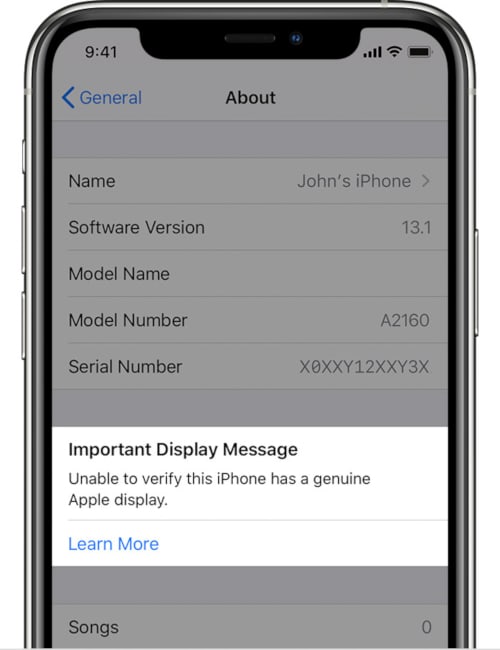Apple has never been friendly to user repairs and yet again the company has stressed its disapproval of using third-party spare parts to repair its devices screens.
Screen and battery replacements are two of the most common smartphone repairs and Apple is targeting both. Last month, the company changed its battery health messaging in an attempt to scare users into only using Apple-authorized repair services.
The warning message that Apple rolled out earlier this year for the iPhone XR, XS and XS Max said: “Unable to verify this iPhone has a genuine Apple battery. Health information not available for this battery.”
The company activated this particular warning with iOS 13.1, and it may also tell users that the company “has updated the device information for” an iPhone.Meaning, the device will make a note that it has an unauthorized part for service needs and safety analysis.
Now the company has introduced similar messaging around Apple screen repairs.

In a new support page, the tech giant said iPhone 11, iPhone 11 Pro and iPhone 11 Pro Max users will see an “Important Display Message” if they replace their screens with an aftermarket component. The message will say “Unable to verify this iPhone has a genuine Apple display.” However, the company has only announced this ‘feature’ for the iPhone 11, iPhone 11 Pro, and iPhone 11 Pro Max.
This warning is apparently displayed for four days and then moves to the Settings menu. After 15 more days, it’ll be moved to Settings -> General -> About, great news is that you only have to put up with Apple pestering you about non-genuine screens for the better part of a month before the company will deign to allow you to use your device in the manner you chose without nagging you about it.

Considering that the messages are pretty hidden, they won’t have any impact on the way people use their devices. Nevertheless, Apple has issued a strong warning in the new support page, telling users that using non-genuine display parts and going to unauthorized service providers could lead to multi-touch issues, incorrect color calibration, and ambient light sensor problems, among others.
tested this behavior by swapping out the displays on several iPhone 11 models. The warnings weren’t present in iOS 13 betas or the final version of iOS 13 that shipped with the iPhone 11, however, it’s baked into the iPhone 13.1 iOS version that’s now being distributed. It’s obvious that Apple hasn’t truly baked anything into the device that can detect whether an authorized screen has been used.“Only technicians who have completed Apple service training and who use Apple genuine parts and tools should replace iPhone displays… Replacements not performed by Apple, authorized service providers, or certified technicians might not follow proper safety and repair procedures and could result in improper function or issues with display quality or safety. Apple displays are designed to fit precisely within the device. Additionally, repairs that don’t properly replace screws or cowlings might leave behind loose parts that could damage the battery, cause overheating, or result in injury.”
Another thing is that iFixit still saw the same message when swapping iPhone 11 displays with other, 100 percent legitimate, Apple-manufactured iPhone displays.
So what’s the problem?
The problem is, without the software tools required to authorize the repair, the message is still shown. Whereby even swapping the FaceID hardware along with the display doesn’t make the message go away.
However, Apple has been clear on its goal to verify third-party repair stores. The company recently announced that it was going to begin opening up its process for authorizing more repair shops to become Apple-authorized resellers, but in the past, the repair programs Apple created for third-party shops did a very poor job of actually providing useful service.
Companies that signed up under these rules were almost always required to ship products back to Apple for repair rather than completing the work themselves. Apple still maintains that it can forbid any firm from performing Apple screen repairs for any reason and that completing all of its required coursework and certifications does not mean that a business will be allowed to qualify as an Apple-authorized repair center.
In August, the company said it’ll offer stores the same “genuine parts, tools, training, repair manuals and diagnostics” as Apple Authorized Service Providers. That means iPhone owners will have more options available to them and repairs will be undertaken using official processes.

